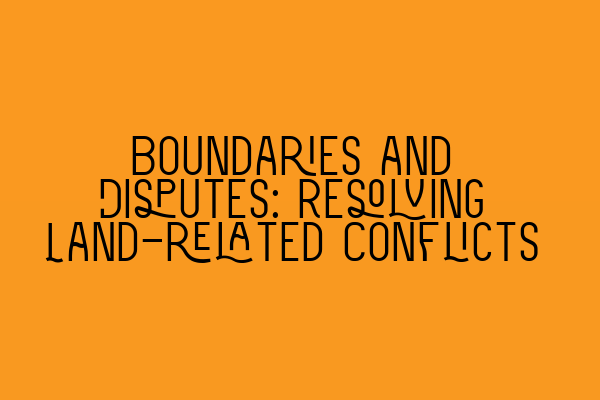Welcome to the SQE Property Law & Land Law blog! In today’s post, we will be exploring the complex and often contentious topic of boundaries and disputes in relation to land ownership. It is not uncommon for individuals and businesses to find themselves embroiled in disputes over property boundaries, leading to legal conflicts that require resolution.
Understanding the intricacies of land-related disputes and the methods available for resolving them is vital for property owners, tenants, and solicitors alike. By delving into the various aspects of boundary disputes and exploring potential solutions, we aim to provide you with insights that will help navigate these challenging situations.
Boundary disputes can arise due to a variety of reasons. One common cause is the lack of clarity regarding property boundaries. Over time, old surveys and informal agreements may lead to confusion, and neighboring landowners may hold differing opinions on where one property ends and another begins.
Another cause of boundary conflicts is encroachment. Encroachment refers to the unauthorized use or occupation of someone else’s land. This may involve structures, fences, or even landscaping that extends beyond the legally defined boundaries.
Additionally, disputes can arise when there is a change in ownership or property developments that affect shared boundaries. Construction activities, additions, or alterations to existing structures can result in altered boundary lines, leading to disagreements between adjacent property owners.
The resolution of boundary disputes typically involves an examination of historical land deeds, surveys, and title plans. In England and Wales, the Land Registration Act 2002 plays a crucial role in determining land ownership and resolving conflicts.
The Act emphasizes the importance of registered titles and aims to simplify the process of ascertaining property boundaries. However, disputes can still arise if unregistered land is involved or if there are conflicts between registered and unregistered titles.
When attempting to resolve a boundary dispute, it is important to consider alternative dispute resolution (ADR) methods. ADR techniques, such as mediation or arbitration, can often provide quicker and more cost-effective solutions compared to going to court. These methods encourage parties to engage in constructive dialogue and work together towards finding a mutually acceptable resolution.
However, in situations where the dispute cannot be resolved through ADR, litigation may be necessary. Engaging the services of specialist property law solicitors is essential, as they possess the expertise to navigate the complex legal landscape and fight for their clients’ rights.
If you find yourself entangled in a boundary dispute, seeking professional legal advice is crucial. At SQE Property Law & Land Law, we specialize in resolving complex property-related conflicts. Our team of skilled solicitors has extensive experience in handling boundary disputes and is well-versed in the intricacies of property law.
Our mission is to provide comprehensive and cost-effective solutions to our clients, ensuring their rights are protected throughout the legal process. We employ a client-centric approach, taking the time to understand our clients’ unique circumstances and goals, and tailoring our strategies accordingly.
Contact SQE Property Law & Land Law today for a consultation, and let us help you navigate the challenging terrain of boundary disputes. We are here to guide you through every step of the process and work towards a favorable resolution.
